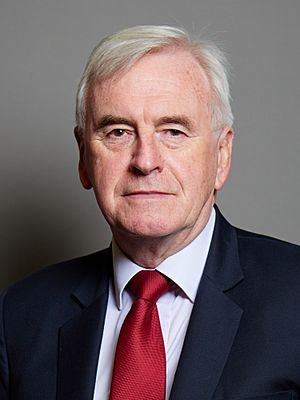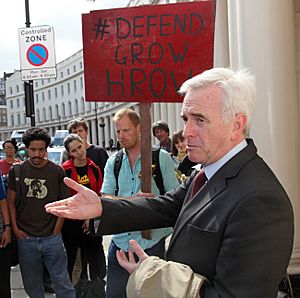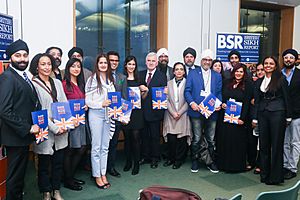John McDonnell facts for kids
Quick facts for kids
John McDonnell
|
|
|---|---|

Official portrait, 2021
|
|
| Shadow Chancellor of the Exchequer | |
| In office 13 September 2015 – 5 April 2020 |
|
| Leader | Jeremy Corbyn |
| Preceded by | Chris Leslie |
| Succeeded by | Anneliese Dodds |
| Deputy Leader of the Greater London Council | |
| In office 7 May 1984 – 7 May 1985 |
|
| Leader | Ken Livingstone |
| Preceded by | Illtyd Harrington |
| Succeeded by | Michael Ward |
| Chair of the Finance and General Purposes committee | |
| In office 11 May 1982 – 21 May 1985 |
|
| Leader | Ken Livingstone |
| Preceded by | Dr Anthony Hart |
| Succeeded by | Alex Mackay |
| Member of Parliament for Hayes and Harlington |
|
| Assumed office 1 May 1997 |
|
| Preceded by | Terry Dicks |
| Majority | 12,031 (31.4%) |
| Member of the Greater London Council for Hayes and Harlington |
|
| In office 7 May 1981 – 31 March 1986 |
|
| Preceded by | Arthur H. S. Hull |
| Succeeded by | Office abolished |
| Personal details | |
| Born |
John Martin McDonnell
8 September 1951 Liverpool, England |
| Political party | Independent |
| Other political affiliations |
Labour (1981–2024; suspended and whip withdrawn) Socialist Campaign Group |
| Spouses |
Marilyn Jean Cooper
(m. 1971; div. 1987)Cynthia Marie Pinto
(m. 1995) |
| Children | 3 |
| Education | Great Yarmouth Grammar School St Joseph's College, Ipswich Burnley Technical College |
| Alma mater | Brunel University Birkbeck, University of London |
| Signature |  |
John Martin McDonnell (born 8 September 1951) is a British politician. He served as the Shadow Chancellor of the Exchequer from 2015 to 2020. This role means he was the main spokesperson for the Labour Party on money and economic matters. He has been a Member of Parliament (MP) for Hayes and Harlington since 1997. An MP is a person elected to represent a group of people in the UK Parliament.
McDonnell was a member of the Labour Party for many years. However, his party membership was suspended in July 2024. This happened because he voted to remove a rule about how much money families can receive in benefits. He is known for being on the left side of politics and is part of a group called the Socialist Campaign Group.
He tried to become the leader of the Labour Party in 2007 and again in 2010 but did not get enough support. When Jeremy Corbyn became Labour leader in 2015, he chose McDonnell to be his Shadow Chancellor. McDonnell wanted to spend more money on things like roads and research. He described his economic ideas as "socialism with an iPad".
Contents
Early Life and Education
John McDonnell was born in Liverpool, England. His family had an Irish Catholic background. His father, Bob, worked as a docker and later as a bus driver. His mother, Elsie, was a cleaner. When John was very young, his family moved to Great Yarmouth in Norfolk.
He went to Great Yarmouth Grammar School. He also attended St Joseph's College, Ipswich, which was a private school. Even though he was raised Catholic, he now says he is not religious but still respects the Church.
McDonnell struggled with his A-levels because he worked part-time jobs. After leaving school, he had several different jobs. He later went back to study at night school. At 23, he moved to Hayes in London. He studied at Brunel University and earned a degree in government and politics. He then got a master's degree from Birkbeck, University of London.
After his studies, he worked for trade unions, which are groups that protect workers' rights. He worked for the National Union of Mineworkers and the Trades Union Congress. He also worked for local councils in London, helping to set policies.
Greater London Council (1981–1986)
In 1981, John McDonnell was elected to the Greater London Council (GLC). This was a local government body for London. He represented Hayes and Harlington. He became the GLC's finance chair and deputy leader to Ken Livingstone.
The GLC was later abolished in 1986.
Becoming an MP (1997)
After the GLC was closed, McDonnell continued to work in local government. He tried to become an MP for Hayes and Harlington in 1992 but lost by a very small number of votes.
In 1997, he was elected as the MP for Hayes and Harlington. He won with a large number of votes. In his first speech in Parliament, he spoke strongly against his predecessor, which was unusual for a new MP.
As an MP, he has supported local campaigns. For example, he opposed the expansion of Heathrow Airport because it would affect local communities. He also disagreed with some of the Labour Party's policies at the time, such as the Iraq War.
Views on the Iraq War
McDonnell voted against the 2003 Iraq War. He believed the war would cause a lot of suffering and make the region unstable. In 2006, he was one of 12 Labour MPs who asked for an official investigation into the war.
Views on the Irish Republican Army
In 2003, McDonnell made some comments about the Provisional Irish Republican Army (IRA) that caused controversy. He said that the actions of groups like the IRA helped bring about peace talks. He later clarified that he was trying to encourage republicans to support the peace process and that he was against violence.
In 2015, he apologized for any offense his earlier remarks had caused. He explained that his goal was to help the peace process move forward.
Groups and Campaigns in Parliament
McDonnell is involved in many groups in Parliament. These groups support different trade unions, like those for public service workers and firefighters. He also works with groups focused on communities, such as the Irish and Punjabi communities in Britain.
He chairs the Labour Representation Committee (LRC). This is a left-wing group within the Labour Party that pushes for socialist policies. He also leads the "Public Services Not Private Profit" campaign, which opposes selling off public services to private companies.
Economic Ideas
McDonnell has often spoken about his economic beliefs. He has said that thinkers like Karl Marx have influenced him. In 2013, he joked about being a "Marxist" when discussing the 2008 financial crisis. He later clarified that he believes there is much to learn from Marx's writings, even for mainstream economists.
Public Services
McDonnell has always been against the privatization of public services. This means he believes services like healthcare and education should be run by the government, not by private companies. He has spoken out against Private Finance Initiatives (PFIs), which are ways for private companies to build and run public facilities.
Tax Fairness
He has also worked to promote tax justice. This means making sure that everyone, especially large companies, pays their fair share of taxes.
Bank Rules
McDonnell has consistently called for stronger rules for banks and the financial industry. He believes that a lack of regulation led to financial crises.
Against Austerity
He has supported campaigns against "austerity." Austerity refers to government policies that cut public spending to reduce debt. He believes these cuts harm ordinary people.
Heathrow Airport Expansion
McDonnell has strongly opposed plans to expand Heathrow Airport with a third runway. The proposed site is in his local area. In 2009, he was temporarily suspended from Parliament for disrupting a debate about the airport expansion. He picked up the ceremonial mace, a symbol of Parliament's authority, to show his anger about not having a vote on the issue.
Shadow Chancellor of the Exchequer (2015–2020)
In 2015, John McDonnell was chosen by Jeremy Corbyn to be the Shadow Chancellor. In this role, he was the Labour Party's main spokesperson on economic matters.
He outlined Labour's economic plans, saying they would aim to reduce the national debt. He also wanted to reform the banking system and encourage different types of company ownership, such as co-operatives.
During a speech in Parliament in 2015, he famously quoted from Chairman Mao Zedong's Little Red Book to make a point about selling off national assets. He then threw the book across the despatch box, which is a table in the House of Commons.
In 2016, he became a member of the Privy Council of the United Kingdom. This means he can use the title The Right Honourable.
After the Grenfell Tower fire in 2017, McDonnell said that political decisions, like cuts to fire services, contributed to the deaths. He argued that the fire showed how austerity policies had negatively affected the country.
He also caused controversy when he made a joke about a Conservative politician, Esther McVey. He later said he was quoting a constituent and did not mean to cause offense.
McDonnell has stated that he wants to "overthrow capitalism" and create a "socialist society." He also said that he believes Marx's Kapital is an important book for understanding the modern capitalist system.
When Keir Starmer became the leader of the Labour Party, McDonnell stepped down as Shadow Chancellor in 2020.
Return to the Backbenches (2020–present)
Since 2020, John McDonnell has been a backbench MP. This means he is not part of the main leadership team of his party.
In 2022, he was one of several Labour MPs who initially signed a statement questioning NATO after the 2022 Russian invasion of Ukraine. However, they later removed their signatures. McDonnell then supported calls for more arms to be sent to Ukraine.
In 2023, he criticized the Labour Party leadership for how they treated some left-wing members and MPs. In July 2024, he voted against the Labour Party's official position on a benefit cap, which led to his suspension from the party for six months.
Political Views
John McDonnell is a prominent figure on the left-wing of the British Labour Party. He is a member of the Socialist Campaign Group, a group of left-leaning MPs.
He opposed the 2003 invasion of Iraq. When asked if he was a Marxist, he said he describes himself as a "socialist" and follows the tradition of past Labour governments, like the one led by Clement Attlee.
Personal Life
John McDonnell has two daughters from his first marriage and a son from his second marriage to Cynthia Pinto.
In 2013, he had a heart attack and took some time off work to recover.
Although he was raised as a Roman Catholic, he now identifies as an atheist. However, he still believes that the values of Catholicism have influenced his political views and the Labour Party's values.
See Also
- Economics for the Many
- Labour Representation Committee
- Socialist Campaign Group
Images for kids
 | Laphonza Butler |
 | Daisy Bates |
 | Elizabeth Piper Ensley |




